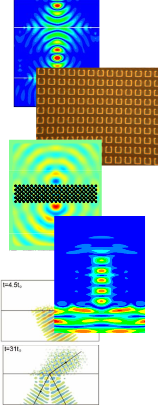Research Activities
Theoretical and Computational Materials Science


The Theoretical and Computational Materials Science Group investigates fundamental relationships between structure and properties of modern materials by employing state-of-the-art theoretical and computational tools. Using supercomputers, we simulate the structure and properties of most "hard" materials ranging from nanocomposite semiconductors to complex metal alloys, metamaterials and left-handed materials.
Research interests of the Photonic, Phononic and Meta-Materials Group (Maria Kafesaki) include the development and study (mainly theoretical but also experimental) of artificial composite materials for the control of electromagnetic and elastic waves. The present emphasis is mainly on photonic and phononic crystals, on left-handed or negative index materials, on random lasers and on plasmonic materials. In addition, the study of the electromagnetic and/or elastic wave propagation in composite materials is used for the understanding of the nature, the structure and the behavior of existing materials of considerable importance (such as soft-matter and biological systems).
The Materials Theory Group (George Kopidakis, Ioannis N. Remediakis) specializes in the atomistic study of the physics and chemistry of the solid state, with applications to superhard materials, optoelectronics, catalysis, and ultra-fast energy transfer. By employing electronic structure methods ranging from empirical force-fields to quantum-mechanical first-principles simulations, we study complex processes such as industrial catalysis, nanoparticle formation and energy storage.
Computational research in magnetism (A. Lyberatos) is carried out by the development of Monte Carlo, micromagnetic, atomistic models and optimization methods to study modern magnetic materials of particulate, thin film and multilayer form. Current focus is the fundamental understanding of heat-assisted magnetic recording which is a new magnetic hard disk drive (HDD) technology which is expected to extend the 1Tb/in2 areal density demonstrated by perpendicular magnetic recording and may become commercially available in 2018. The objective is to study thermal diffusion in nanostuctured FePt thin films with high perpendicular anisotropy and combine with existing models of thermomagnetic writing to help design magnetic media for information storage in future HDD. There is considerable local expertise in the physics of the switching speed of the magnetization and thermal stability of the magnetization during storage. There are many challenging problems which must be addressed for further progress, including multiscale modeling and first-principles calculations of the intrinsic magnetic properties.
Current research topics:
- Left-handed materials.
- Photonic and phononic crystals.
- Surface chemistry and catalysis.
- Carbon-based materials and other superhard ceramics.
- Non-linear dynamics, energy localization and transfer.
Further information:


